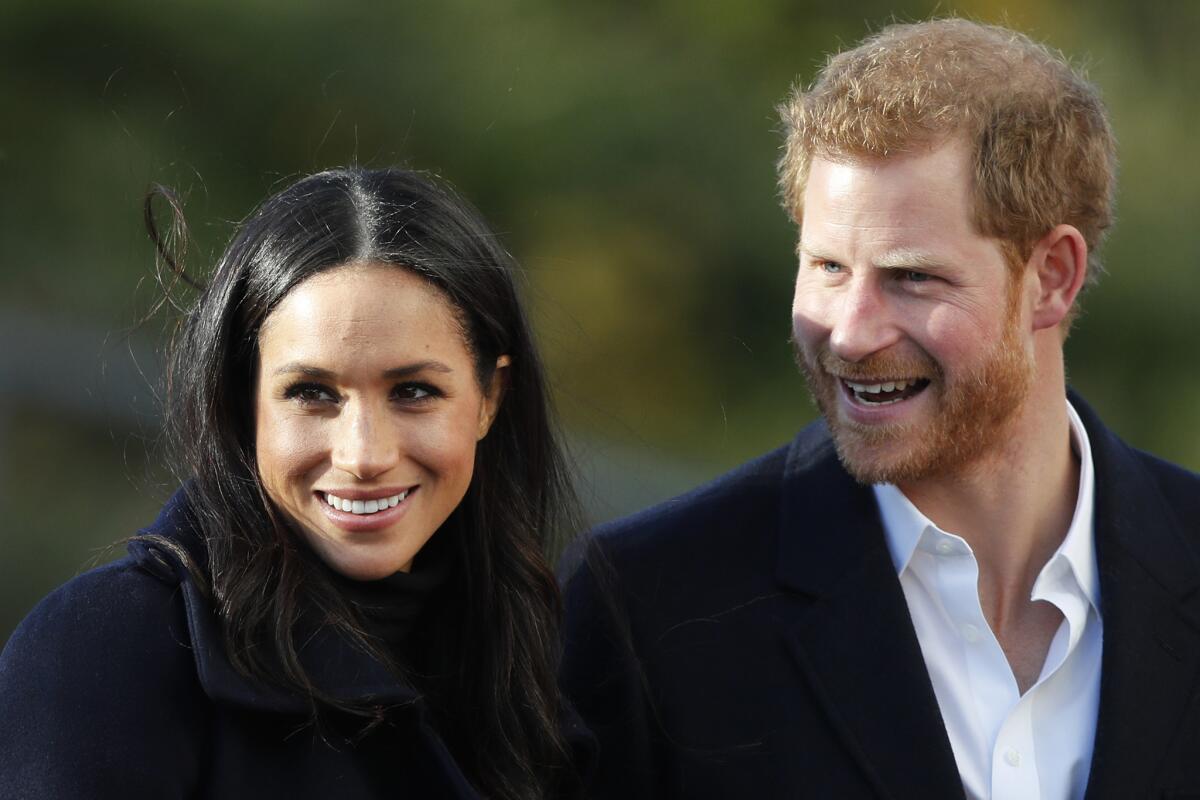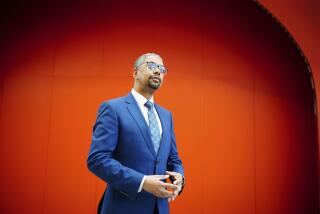A month after Meghan Markle’s exit, Britons continue to debate the role of race

LONDON — It has been a month since Prince Harry and Meghan Markle announced that they would “step back” as senior members of the British royal family. The Duke and Duchess of Sussex can no longer use their “royal highness” titles and will no longer receive public funds for their royal duties. The couple — he is 35; she, 38 — and their 9-month-old son, Archie, have been relaxing on the west coast of British Columbia. They were recently spotted in Miami, where they attended a private function for JPMorgan and dined with Alex Rodriguez and Jennifer Lopez. There are reports that the couple are looking for a house in Los Angeles.
The British have a lot on their minds — it was only last month that the nation formally exited the European Union, ending a tumultuous 47-year affair with the Continent — but it is clear, at least from recent conversations with Londoners, that the royal couple’s departure is still fresh on people’s consciousness. For a nation that has long grappled with its identity, and with its former status as an empire, the question of race looms large.
In 2018, when Markle, a Los Angeles-born divorced former actress whose mother is African American, married Harry, the sixth in line to the British throne, some observers heralded it as a “post-racial” moment. An African American minister, the Most Rev. Michael Curry, delivered a stirring sermon. The Kingdom Choir, a British gospel group, performed “Stand by Me,” a tune made famous by the African American singer-songwriter Ben E. King.
Inevitably, their marriage appears to have revealed complex dimensions of race, class, power and privilege, rather than resolving them.
Slavery helped build modern Britain; at its peak, the British Empire covered a fourth of the world’s land mass. Over the past 75 years, since the end of World War II, Britain has struggled to change from empire to commonwealth, and from colossus to mere country; its debates over how much it should integrate with the rest of Europe have been emblematic of that struggle.
In an opinion essay last month in the New York Times, Afua Hirsch, a black British journalist who also teaches journalism at the University of Southern California, said the reasons for Markle’s departure from the royal system were of no surprise to black Britons, noting racist headlines in the Daily Mail, a tabloid, about Markle being “(almost) straight outta Compton” and having “exotic” DNA. Even before the couple married, they complained of vicious treatment by the press; in an extraordinary 2016 statement, the royal family condemned “the racial undertones” of commentary directed at the couple.
“No matter how beautiful you are, whom you marry, what palaces you occupy, charities you support, how faithful you are, how much money you accumulate or what good deeds you perform, in this society racism will still follow you,” Hirsch wrote.
In an interview, Hirsch said that in the United States, “people acknowledge that race is a thing,” whereas in Britain, “all of our energy is expended trying to prove it exists.”
Hirsch said that some Britons maintain a sense of moral superiority because Britain was not home to the chattel slavery that existed in societies from Brazil to Cuba to the United States. And yet, it was not until 1807 that the British Empire abolished the slave trade, and British merchants and landowners operated plantations across the Caribbean well into the 19th century.
Hirsch’s narrative touched off debate. Writing in the conservative newspaper the Telegraph, columnist Sherelle Jacobs argued that Hirsch “conveniently overlooks the overwhelmingly fawning coverage that the duke and duchess enjoyed, from their engagement to their wedding day,” and the harm the couple might have inflicted to their own reputations. “Emotional baggage from our country’s legacy of aristocratic privilege has endowed Middle England with the kind of stridently meritocratic values that are a complete anathema to judging people by their color,” Jacobs argued.
In recent interviews, a number of black Londoners said the role of race could not be denied.
“In British society, people want to say racism doesn’t exist,” said Esther Adjepong, a 35-year-old musician who lives in Brixton, a South London neighborhood with a historically large Afro-Caribbean community. She said that addressing race is like “banging your head against a brick wall,” adding: “You can be a black person in this country screaming out ‘I’m discriminated against,’ and you’ll just be told, ‘No, you’re not. What are you talking about?’”
The reality Markle has endured is familiar to Adjepong. “We recognize that as being racially motivated because its how we are treated and have to navigate society,” she said. “People aren’t willing to just be honest and open their eyes to see what’s right in front of them.”
Amy Francis, 73, a retiree who lives in the borough of Wandsworth in southwest London, said the couple’s departure should serve as a rebuke to British society. “May they shame the public and live together till death do they part,” she said. “Leaving was right. They need freedom. I’m glad they’re free.”
She added: People don’t “love Meghan, because she’s black.”
Larelle Benjamin, 24, a paralegal who lives in Croydon, in South London, said that too much emphasis had been placed on the duchess. “It’s good that Harry stepped out of tradition, but Meghan is getting the backlash. People are blaming her for leaving, but it’s a joint decision.”
She added: “More change in the royal family is good. They’re getting more black in there.”
Others said they were tired of the subject. Anton Davis, a 29-year-old barber in Brixton, said he could not care less about the monarchy. “They have nothing to do with real people,” he said.
While people of African ancestry have lived in Britain for centuries — and an 18th century queen, Charlotte, might have had African ancestors — most modern black Britons are descended from immigrants who made their way to the British isles in the last century, particularly after 1948, when Parliament opened the door to people from colonies in the West Indies and Africa to settle in Britain.
Despite that increasing diversity, Markle was never going to fit into the royal family because it “globally signifies whiteness,” according to Kehinde Andrews, a black studies professor at Birmingham City University.
In Britain, the doctrine of scientific racism was refined and deployed to support the colonization of much of Africa, the Caribbean and Asia. The royal family no longer has much political power today and serves a largely symbolic function, but, Andrews said, it still represents an imperialist past that tortured, starved, killed and raped to dominate other countries.
“This backlash was always going to happen because blackness doesn’t fit in this mold,” he said. “It was inevitable. Particularly now that Brexit is done.”
The nearly four-year process of leaving the European Union triggered a “massive resurgence of English white nationalism,” he said.
The number of reported hate crimes in England and Wales has more than doubled since 2013, according to a government report. And 76% are said to be racially motivated.
“The royal family — this symbol is a white symbol,” Andrews said. Markle “was never going to have a chance. In this climate, there was no way.”
Writing in the liberal newspaper the Guardian last month, Amna Saleem, a Pakistani-Scottish writer and comedian based in Glasgow, lamented the treatment of Markle. “Critics have argued that Markle knew what she was signing up for, and should have been more prepared,” Saleem wrote. “But the onus should not be on people of color to swallow racism.
“If Markle, a former successful actor who was largely palatable to an overwhelmingly white media, can be harassed into stepping away from the crown, then how might the public react to someone with less privilege than her?”
That is probably not the mainstream view in Britain. At President’s Trump’s State of the Union address at the U.S. Capitol last week, one guest was Nigel Farage, the leader of the Brexit Party.
This reporter asked whether there was any racial element in Markle’s departure, and Farage scoffed. “Any suggestion that there was even an inch of racism in what’s happened is simply wrong and deeply insulting to a country that is very relaxed about these things,” Farage said, adding that the couple have “chosen exile.”
He added: “And frankly, good.”
More to Read
Sign up for Essential California
The most important California stories and recommendations in your inbox every morning.
You may occasionally receive promotional content from the Los Angeles Times.











